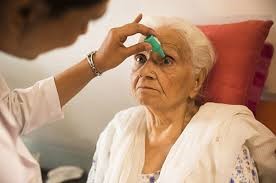 “My mother has been complaining about blurry vision, and I am concerned she might be developing cataracts. I don’t know how she is going to adjust if she loses her sight! Is there anything that we can do, or is it too late to save her vision?” – Silvia from Woodstock
“My mother has been complaining about blurry vision, and I am concerned she might be developing cataracts. I don’t know how she is going to adjust if she loses her sight! Is there anything that we can do, or is it too late to save her vision?” – Silvia from Woodstock
If your loved one has cataracts, she is in good company, but it doesn’t mean her sight is gone forever. By the time people reach 80, at least half of the elderly population will either have cataracts or have had surgery to remove them. Usually, you can tell if your loved one has a cataract, thanks to the distinctive cloudy appearance which results from a clumping of protein inside the lens. Let’s talk more about what causes cataracts in seniors as well as how to prevent and treat them.
Nature and Nurture
Cataracts can be hereditary, but they can also come from other health conditions or lifestyle choices. For example, diabetes can cause cataracts, as can prolonged steroid use which may be for other health problems. A history of smoking and alcohol use can also lead to cataract formation as well as prolonged sun exposure. Even an eye injury in the past may result in cataracts as a senior. Now a bit of disturbing news: cataracts can occur in children and people in their 40s. They can be mild to severe, and they do get progressively worse over time.
Signs and Symptoms
Blurry vision is perhaps the most obvious symptom of cataracts in seniors, but it is hardly the only one. Be on the lookout for some of these other signs:
- A halo-like glare surrounding light
- Cloudy images
- A brownish tint or dulled, faded colors
- Poor vision at night
- Double vision
- Frequent prescription changes
Any time your loved one notices vision problems, he or she should visit the eye doctor for a thorough exam. The ophthalmologist may dilate your senior’s eyes to check for cataracts and other conditions, and based on the exam, make recommendations for treatment.
Options and Treatments
Unfortunately, there is no cure for cataracts, and treatment depends on the severity of the vision loss. If your loved one in the early stages, no treatment may be needed. Instead, lifestyle changes can improve sight, at least in the short-term. Simple adjustments such as reading large-print books or listening to audio books, using a magnifying glass, or relying on brighter light bulbs may make daily activities and hobbies easier. Check the home environment for any tripping hazards, as falls can occur in seniors with vision problems. When outside, your loved one should wear a hat and anti-glare sunglasses to prevent harmful UV ray exposure. Of course, it goes without saying that alcohol consumption should be limited (and smoking stopped altogether), and your senior should also eat a healthy diet rich in fruits and vegetables to improve eye health. A new glasses prescription may also correct some of the symptoms.
More severe cataracts may not respond to these home remedies, and in those cases, surgery may be the only option. Luckily, surgical treatment is common, safe, and effective. Only one eye is treated at a time, and the recovery time is roughly four to eight weeks. Because the patient does not need general anesthesia, healing may not take as long as other types of surgery. You can reassure your loved one that cataract surgery has a high rate of success and zero fatalities.
Fortunately, cataracts cannot come back after surgery, and if your senior has a cataract in one eye, it does not mean the other eye will get one. Schedule regular vision checks for your loved one to keep on top of any problems, and while you’re at it, schedule one for yourself too.
Best of luck!
About the Author: Lisa Kaufman, MS, CMC, CTRS, C-EOLD is a certified Aging Life Care Manager™, and most recently, a certified End of Life Doula. She has owned and operated SeniorCare Options since 2001, and she is an active member of the Aging Life Care Association™, and is one of only a handful of certified care managers in Georgia. She is a Past-President of the ALCA™ South Eastern Chapter and is the only Fellow / Certified member of ALCA™ in Georgia.